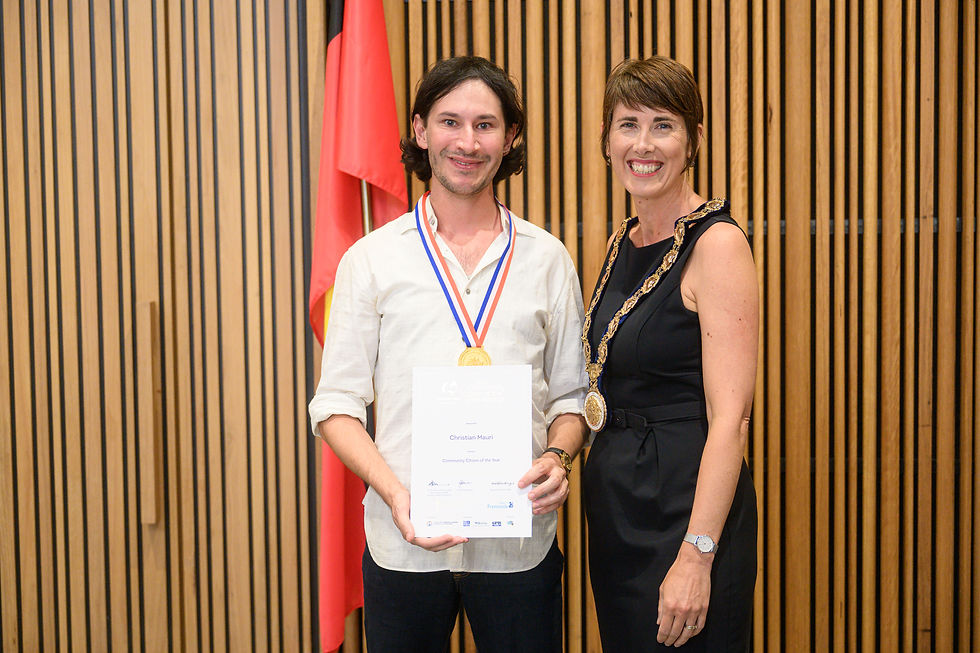Citizen of the Year
On 24 January, 2024, I was elected Fremantle Community Citizen of the Year. As a historic first, the award was granted to two recipients, the other being the magnificent Sarah Booth.
The top questions people ask when they see the medal are:
1. How did you get that?
2. How can I get more involved in volunteering?
In the spirit of encouraging you to get involved in community work, I'll attempt to answer these questions on this page.
Following the award, a bunch of cool cats from the Fremantle community decided to hold an event, coronating me as the "King of Fremantle." I've included a video from that night at the bottom of this page.
Getting elected.
Citizen of the Year is run by an organisation called AUSPIRE. Each city has annual nominations for citizen of the year in four categories: Young (16-30 y.o.), Senior (65+ y.o)., Active (a.k.a. group of people), Community (the big one). You can be nominated for any that you are eligible for, but only win one.
The nomination involves a five page submission of what the nominee has done. As you can imagine, it takes a lot to fill five pages, so this acts like a filter. The nomination also encourages references from community, which can be identified or anonymous.
The nominations are deliberated on by a selection committee comprised of councillors, city officials, and the previous community citizen of the year.
The successful recipient is awarded on (or around) Australia Day, receiving the medal and a certificate from the Governor.
I received a number of nominations. You can read the successful one in the gallery to the right.

Nomination for Citizen of the Year

Nomination for Citizen of the Year


Nomination for Citizen of the Year
Advice for Actually Doing it
About midway through the year I committed to wearing the medal our as a conversation starter (warning: most Aussies do not like this). A top point of discussion from folk on the street was "I've been wanting to get more involved in community work for a while, do you have any advice?" The videos to the right sum up my broad response. I share my top two top tips below.
1. The moment the thought occurs to you, make an explicit and visible commitment. This can be finding an event and locking it into your calendar, or making a promise to catch up with someone lonely, complete with a where, when and what all of your devising (don't ever place a ball in their court!). You can do this all by yourself. You don't need an institution or NGO. Don't let the perfect be the enemy of the good. It doesn't matter if it's not the "most impactful way" to spend your time. So long as it's spent on something other than yourself, it's a Good start.
2. Accept it'll be hard & persevere. The most damaging conceit in community work promotion is that it will make you feel good.
While some volunteering is undeniably lovely (there was a lot of free yoga at the beach instructors in the recent nominee round), the fact is that a lot of desperately needed community work is spent with people who are down and out, in full-on moments, doing work that will ultimately be more than you expected.
On top of this, a lot of us (myself included) spend so much time in this very modern world using our mobile devices to annihilate our dopamine stores that venturing into such contexts in search of "feel good experiences" is to set yourself up for attrition.
It is better to resist such messaging and manage expectations. Accept that Good Work will be Hard Work. Accept that you are not the beginning and end of the feedback loop. Stick with it to the point that it becomes as routine as brushing your teeth. It takes time. It's worth it. You may well gain all sorts of rewards. But even if you don't, your time was well spent.
There is power in this fact. Removing the you from the equation, is a magnificent boost for getting out of bed in the morning and collapsing into it at night. If you find yourself saying, "I tried volunteering, but it wasn't for me," you're halfway to getting it.

